How to sell sustainable coaching in a world of ‘overnight abs’. 6 strategies for better client buy-in and a stronger coaching business.
In a world of ‘overnight abs’ and ‘drop 20 pounds this week’ promises, is it even possible to sell sustainable results — and the long-term coaching required to get them? Here at Precision Nutrition, we’ve been doing just that for 15 years. Here are 6 strategies to help you do it too.
+++++
Six weeks to cheese-grating abs.
Melt off two dress sizes in time for the summer.
Lose 18 pounds with Dr. Oz’s new revolutionary paleo-vegan diet.
Short-term fat loss programs that promise sexy, dramatic results are everywhere.
Sometimes, for specific populations – think highly conditioned bodybuilders, fitness models, or athletes in training – these programs can be legit.
However, for most people, something else is required. 30-day hacks won’t help them get the results they’re after, or maintain their results in the long run.
If you’re a health and fitness professional, you’re probably on board:
“I know, Dr. Berardi! I want my clients to get sustainable results too! I want to help them change their lives for good! Let’s burn those ‘7 days to your dream body’ magazines!”
On the other hand, you probably wonder, “Will people actually pay for coaching that doesn’t promise overnight results?”
Well, you’re not alone. PN Certified coaches are always asking about this. And I get it. A realistic, research-backed coaching program doesn’t stand out as much as neon headlines and celebrity body pics.
But not only is it possible to sell sustainable results — and the longer-term coaching program that comes with that promise — it’s also:
- Better for your business (read: highly profitable)
- Better for your clients
- Better for your professional reputation
- Better for you as a learning, growth-oriented practitioner
So, in this article, I’ll show you why we love sustainable coaching, how we sell it, and how you can use it to bolster your practice too.
++++
Are sustainable results a harder sell than, well, instant gratification?
It’s a legitimate question. Here’s how it was articulated recently in our ProCoach Facebook group:
“I just got off the phone with a friend who’s a marketing wizard. I told him about my plans to launch a 12-month transformation challenge through ProCoach.
He said it’s going to be very tough to sell 12 months of coaching in a world of ‘6 weeks to ripped abs’.”
Lots of other ProCoaches agreed: A 12-month program focused on daily practices and skill development is a tough, if not downright impossible, sell.
But is it?
After all, Precision Nutrition’s coaching program lasts 12 months.
… and we’ve been doing it for close to 15 years.
… with over 100,000 clients.
… who’ve lost millions of pounds, creating healthier lives.
… and we’ve built a ~$200 million dollar business doing it.
So… is selling a 12-month program possible? Yeah, I’d say so.
And that’s good news because we all want to help our clients and patients succeed beyond quick fixes. We all want to help them:
- Learn to grocery shop and cook, not just follow a meal plan, like a robot, until they can’t follow it any longer.
- Tune into their own physical signs of hunger and fullness, not just count calories and look to external cues for how to eat.
- Practice exercise as a regular habit, not take a 2-week trip to BEAST MODE TOWN until their enthusiasm, or their knees, blow out.
- See that healthy living is accessible to all, not just to those who can afford unicorn plasma injections or food grown exclusively in organic utopias.
- Realize that change is incremental and often slow, and that there are no quick fixes or magic pills.
If you’re reading this, I trust that — instead of just giving someone a meal plan, a prescription, or an exercise routine — you’re more interested in helping to build the kind of person that’s capable of change.
Lasting change.
If so, let’s talk more about how sustainable coaching does that.
Then I’ll teach you how to sell it.
++++
Sustainable coaching turns everything it touches to gold.
Ok, not everything and not literal gold, but adopting a sustainable coaching model makes many things better — including some that might surprise you.
Benefit #1:
Sustainable coaching is good for business.
Simply put, you won’t have to hustle so hard.
When you choose to sell a short-duration program, you trap yourself (intentionally or not) in a short business cycle.
Every 8 weeks (or however long your crash course lasts), you lose clients.
Sadly, those clients go gain the weight back or get deconditioned (more on that later), and you have to go out and get a whole batch of new ones.
As business professionals already know, it’s more expensive / time-consuming / ulcer-inducing to acquire a new customer than it is to keep a current one.
In other words, a longer coaching program means clients stick around longer. So you can spend less time on client-hunting, and more time on coaching and getting the best results.
Speaking of which…
Benefit #2:
Sustainable coaching will give your clients better results.
Changing eating and exercise habits is a hard and sometimes slow process.
Sure, the physiology is simple:
- Eat the right amount (for most people, that’s less) + move the right amount (for most people, that’s more) and you can expect results.
But, when someone attempts to eat less or move more, they’re fighting against (often) a lifetime of deep-seated habits.
Habitual behaviors have a purpose – whether the person doing them knows it or not – and they fit perfectly into the person’s life. These habits may be coping mechanisms. If you take them away abruptly, everything falls apart.
That’s why changing everything at once is unrealistic.
It’s also why people 95% of people “regress” after short-duration programs.
True progress comes not from “overhauling,” but from building transferable skills. Systematically.
When clients strategically replace old habits with new ones developed through daily, intentional actions, they learn things like:
- What’s truly important to them
- Prioritizing and time management
- Mindfulness, self-compassion, and emotional regulation
- Persistence and consistency
- Flexibility and resilience
These skills are useful in all areas of life. But they’re absolutely crucial for body transformation.
These skills are the difference between finally achieving the body and health you want, and continuing to yo-yo for all eternity.
Benefit #3:
Sustainable coaching earns you a stellar reputation.
Sure, clients will brag about you — in the moment — if you help them knock off 20 pounds in 2 weeks. However, when you help clients change every fiber of their being, they’ll sing your praises in a totally new and long-lasting way.
And that praise will have a lot to do with how you’re different, about how they feel under your care.
You see, clients don’t want to feel like they’re just another faceless collection of measurements. Yes, they want results, but they also want someone who takes the time to get to know them, and makes them feel cared for and understood.
When a client has that kind of experience, you’ll hear:
- My coach just gets me. She takes time to listen and seems to really care about what matters to me.
- I trust my coach. I’ve told him some pretty raw stuff and he never judges me. He’s always there for support.
- My coach is different. She isn’t just pushing a one-size-fits-all agenda. She always finds a way to help me make changes that work in my own life, no matter how crazy it gets.
When people have those kinds of experiences with a coach, they’re going to talk about it — possibly with tears — to the important people in their lives.
But guess what? Building that kind of relationship, one that’s based on real connection, trust, and a deep understanding of what makes a person tick?
It takes time.
And that’s what sustainable coaching gives you. When you (and your clients) know you have more time together — when you’re not sprinting against some arbitrary weight loss clock — you can forge meaningful connections.
You’ll enjoy your job more, and your advertising will take care of itself, because your clients won’t be able to stop recommending you.
Benefit #4:
Sustainable coaching makes you a better coach.
When you commit to your clients long-term, you’ll become a better coach.
You’ll learn to teach and build skills in the context of a person’s real life, not just a small window of time. You don’t get those kinds of learning opportunities when you only coach someone for 6 weeks.
In “quick-fix” programs, you may get sky-high compliance because motivation is high and real-life obligations can be put on hold for short periods. But what happens when those 6 weeks are over? Do those same highly-motivated, highly-compliant clients stay motivated and compliant?
Do they stay motivated and compliant when injuries flare up, when results plateau, when the kids demand attention, when they get sick of green smoothies, when work piles up, or when the dog poops in their gym bag?
When you stick with a client long-term, you encounter real humanity. This will sharpen your coaching skills like nothing else.
When you coach long-term, you’ll learn how to support people through:
- The “grind.” Motivation crashes and all healthy habits just feel boring and torturous.
- Injuries. Can you coach someone with an injury safely? And focus on other ways to keep them active?
- BIG life events. Deaths, births, job changes, illnesses, moves, and many other often unexpected transitions can throw people out of their routine and into unfamiliar, challenging territory.
- Result plateaus. When effort hasn’t changed but measurable progress has slowed, or even stopped completely…WTF??
- Tantrums, hissy-fits, and breakdowns. Did I mention change is hard? And that it can bring up, pardon my French, all kinds of crap? Yeah, it can.
When you coach people for longer periods of time, you see more of their lives. All the mess and all the beauty. And that requires YOU to adapt and support, no matter the circumstances.
It requires you to become a well-rounded, help-anyone-through-anything supercoach.
++++
One caveat about sustainable vs. short duration programs.
While I’m obviously a fan of longer-term sustainable coaching for all the reasons above, don’t make the mistake of thinking I don’t like shorter programs, or that I’d never use them.
They can certainly be used for specific goals (abs for summer, fitness competition, destination wedding dress) or even as a way to funnel people into a longer-term, sustainable coaching offering.
So, make no mistake, this isn’t an either/or thing. Some of the most successful coaches I know have different offerings for different types of clients. You might consider doing the same.
++++
Okay, so how do I sell sustainable coaching?
Hopefully, at this point, you’re excited about sustainable coaching and the benefits it offers your clients, and your business.
But how do you get clients excited about it? (Because trust me, they’re still going to come to you asking how to get ripped abs, like, yesterday.)
I’ll show you what we do at Precision Nutrition.
If you’re a coach (or health and fitness professional) who wants to add sustainable coaching to your business, here’s our secret sauce for selling 12-month programs.
1. Know who you serve, and what they really, really want.
Many people looking for a coach — but not all — have already been through the revolving door of “miraculous results in 10 days.”
They’re tired of losing weight fast on some crash diet, only to be thrown off the horse to gain it all back. They’re tired of yo-yo-ing, and they’re tired of programs that only leave them feeling dejected and hopeless in the long run.
Those are your people. Those are the people who are looking for something different, something that lasts.
They’re our people, too. At Precision Nutrition, we know who our coaching is for, and who it isn’t for.
On the FAQ page for our coaching services, we explicitly say:
“Precision Nutrition Coaching is not for figure or fitness models, professional bodybuilders, or high-level athletes training for a particular sport.”
“It’s also not for people who already have all the accountability they need.”
“If you rarely struggle to maintain consistent exercise or eating habits, then we’re not a good choice for you.”
We’ve also run full advertising campaigns designed to attract people who’ve struggled with programs like Weight Watchers, Jenny Craig, Body For Life, P90X, etc. In those ads we’ve used words like:
“(X program) failed you again? Try something different this time. Something that lasts.”
In the end, it’s ok to not be for everyone. But for those you are for? Get to know them well. Know what they’ve tried before. And what they want next.
At PN we know our prospects want to eat, move, and live better. For life. Even though they kinda wish it would happen overnight, they also know that the overnight thing has never worked for them before. It isn’t their first rodeo.
That’s why, if we can demonstrate our method has worked for others like them, they’ll be ready to commit to something different. To us.
And, because our clients commit to us, we commit to them. We’ve made it our mission to understand our people and develop a program that delivers results in the context of their needs and their dieting/fitness history.
Now it’s your turn.
Get to know the people you do serve, and go all in for them.
2. Promise those people a hopeful future.
Now that you know what your clients want, promise them a hopeful future in which they get what they want, and make sure your promise is believable.
This image (from this excellent post) says it all:

Don’t talk about habits, sustainable change, or lessons and thought exercises. Don’t talk about custom workouts. Don’t talk about diets, meal plans, or menus.
Instead, focus people’s attention on the hopeful future they can expect when working with you. Tell them about how you’ll help them:
- Eat better, without dieting or feeling deprived.
- Get active, no matter what shape they’re in now.
- Ditch the food rules, dropping the fad diets and conflicting advice.
- Build fitness into their life, without it taking over.
- Achieve, and maintain, their goals, even when life gets busy.
Tell them how they’ll end up:
- Losing the weight/fat they haven’t been able to shed for years.
- Building physical strength and confidence in their body.
- Gaining mental confidence, no longer hiding their gifts and talents.
- Letting go of food confusion, learning what to do, how to do it.
- Getting off the diet roller coaster once and for all, and never looking back.
Really paint the hopeful future picture.
Help them imagine a life where they can…
…feel physically and mentally strong, capable of taking on any challenge without worrying that their energy levels or body weight will get in the way.
…run around with their kids, or grandkids, without feeling pain, winded, or tired; and they can do it again the next day.
…excitedly book a beach vacation without wondering how they’ll look (or feel) in a swimsuit, walking along the beach.
…look forward to having their picture taken without wondering “who’s that person, and when did they start looking like that?”
…feel like food is their friend, not their enemy, and never diet again.
Even better, show them real examples of other people you’ve helped live this more hopeful future.
Like this:
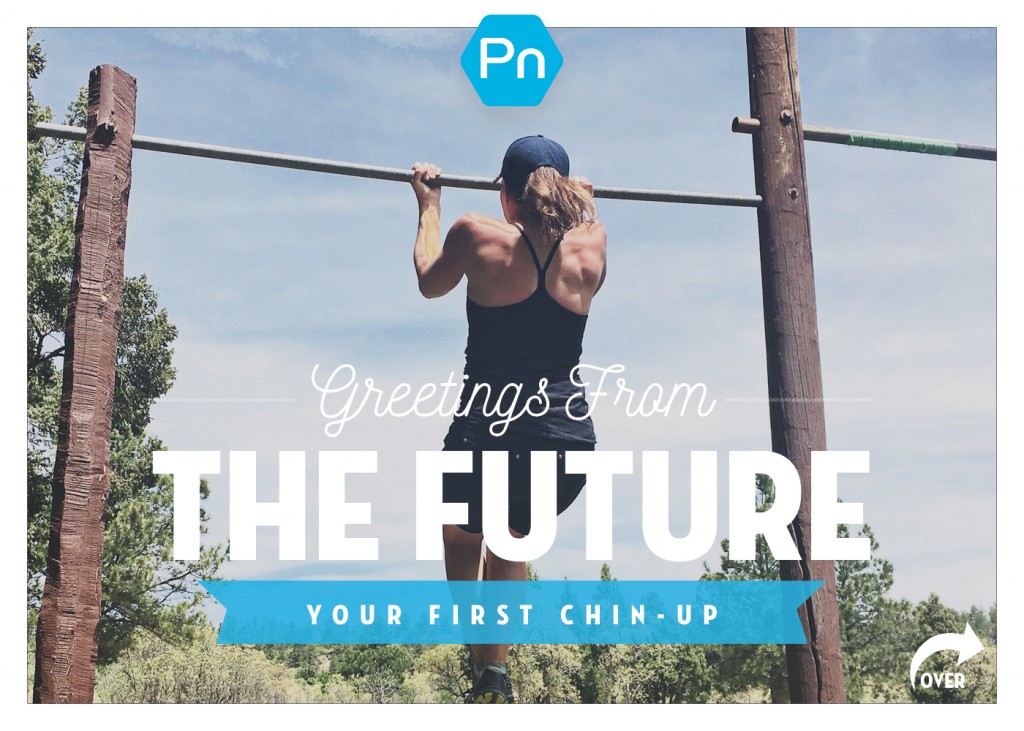
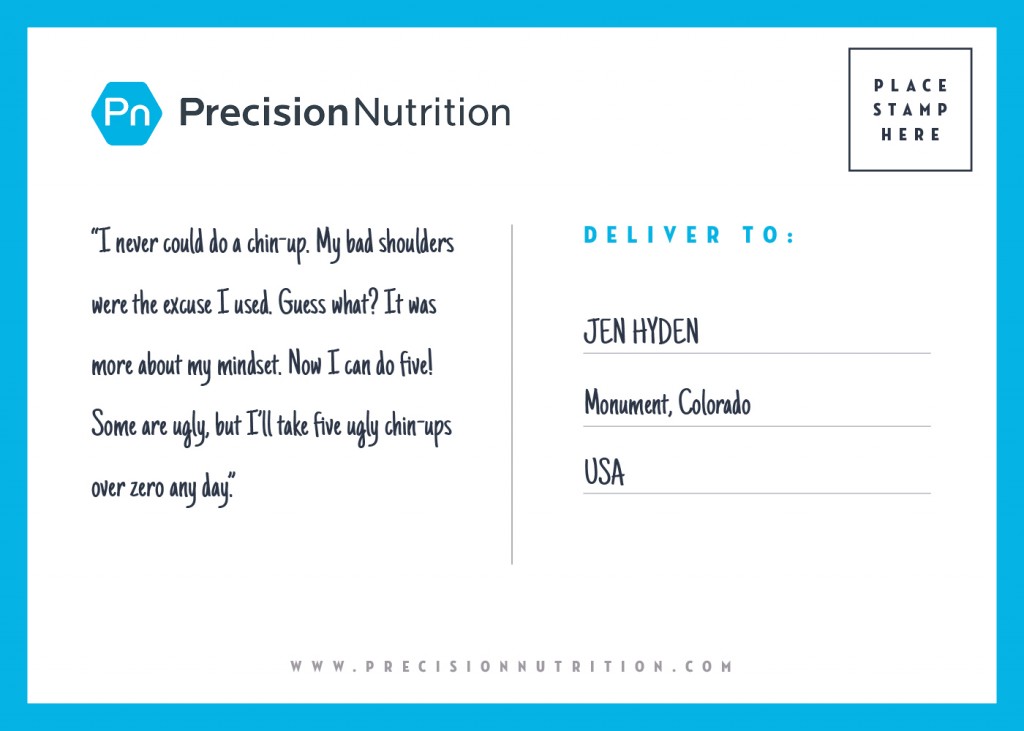
Or this:

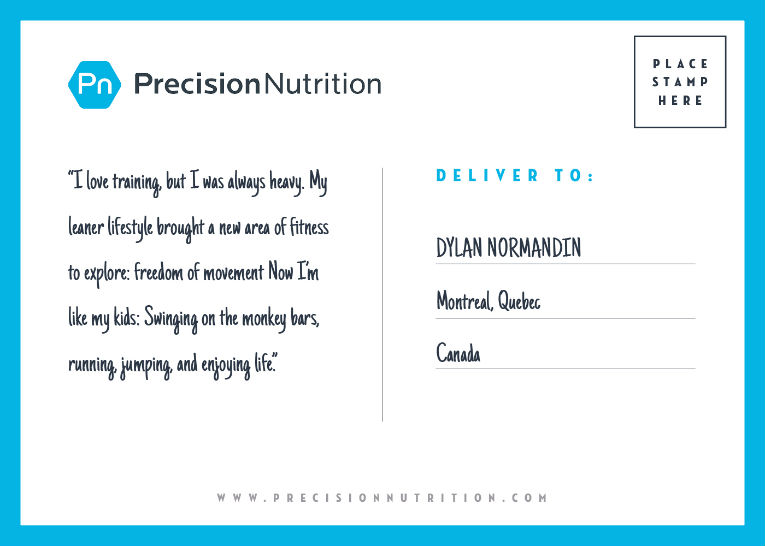
Check out 11 more examples in this article.
In the end, don’t talk about your products and services. Talk about the hopeful future people can live if they experience your sustainable coaching program.
And then deliver the hell out of it.
3. Manage expectations early.
If you’ve started (or completed) your Precision Nutrition Certification, you likely know the phrase “ready, willing, and able.”
Whenever we sign clients or students up for our programs, or whenever we discuss adding new habits or responsibilities, we assess a person’s readiness, willingness, and ability to change.
You should do the same. We think it’s so essential that we’ve built the assessment right into ProCoach, our professional coaching software.
When you know how “ready, willing, and able” a person is, you can:
- Assess fit and find the right people for your sustainable coaching option, which will help with client engagement and retention
- Get to know your client better and understand what motivates them
- Clarify yours and your client’s expectations of each other
- Anticipate roadblocks and plan how you’ll overcome them
Our ProCoaches are big advocates of managing expectations early for their sustainable coaching clients.
Take it from ProCoach Michael Espinosa, who learned after his first cohort of clients to set expectations early. He says:
“With my first round of clients, I think I was so enthusiastic that I ended up unintentionally coercing people who weren’t really ready. I had a big drop-off partway through the program.”
“The second time around, I stopped trying to persuade people and just focused on finding clients who were the right fit and ready to commit. I even kind of tried to scare them a little bit! Like, ‘Are you really ready for this?’”
“I had a smaller cohort, but they were more engaged and didn’t drop off. I’ll definitely continue assessing commitment. It works much better that way.”
Have the commitment talk early in your coach-client relationship. That way, once the program starts, your client already knows what they’ve agreed to.
Again, this isn’t just relevant for sustainable coaching programs.
If you’re also offering shorter-duration coaching options, your assessment and expectation-setting process will be really useful there too.
4. Anticipate disengagement, resistance, and plateaus.
Because long-term coaching programs are, well, long, you will get to see a bigger range of client successes… and challenges.
If you coach someone for a year (or really anything longer than 3 months), you’re likely to encounter one (or all) of the following:
- Disengagement: The client is, frankly, just bored.
- Resistance: The client doesn’t believe in the program anymore or stops wanting to do it.
- Plateau: The client stops seeing desired results for a period of time.
During these phases you might hear things like:
“My friend is on the SlimQuick diet and she’s lost 10 pounds in two weeks! It’s been a month and I’ve only lost 2!”
“My life is so crazy right now that I barely have time to eat at the drive-thru, never mind go to the gym!”
“I’m tired of lifting those stupid dumbbells. I’m tired of chewing salad. I’m tired of thinking about protein or getting enough sleep or managing my stress! ARGH!”
Anticipate these moments. They’re normal.
You may even prepare your clients for them.
ProCoach Irene Pace actually plans for disengagement! She says:
“I like to set a plan with them for when they disappear. I say to them:
‘We are together for a year. In that year, there will be times that you need to or choose to spend less time with the program. This is normal. What would you like me to do when that happens? What would be most helpful from me to help you re-engage?’
This conversation prepares the client to feel unmotivated sometimes – and establishes that it’s a normal part of change! It also helps me understand how to help them when disengagement happens.”
If you prepare early for these coaching challenges, that preparation will help remind you, and your clients, that you’re not failures because boredom or impatience or resistance sets in.
You’ll realize these are things you’re supposed to feel when going through an authentic change process. And that’ll increase the odds you both stick to it.
5. Build a track record with your clients’ amazing results.
You’ve found your people. They’ve seen a hopeful future. They’re committed. Together, you’re rolling through resistance. So get ready for amazing results.
But don’t let them go undocumented.
In our “How to build a track record and demonstrate your excellence” article we share strategies for collecting client data.
These can be progress pictures showing physical changes; numbers that tell a story of how a client’s body fat, body measurements, or blood markers have changed; or client testimonials about their experience with you.
Soon you’ll have an impressive portfolio of success stories to show prospects. Forget telling them you can help them; show them the evidence.
Like this:
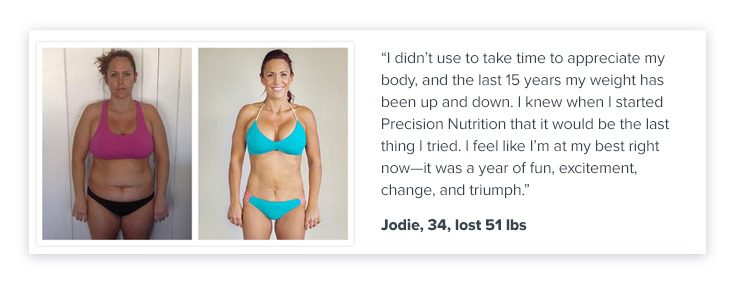
Or this:
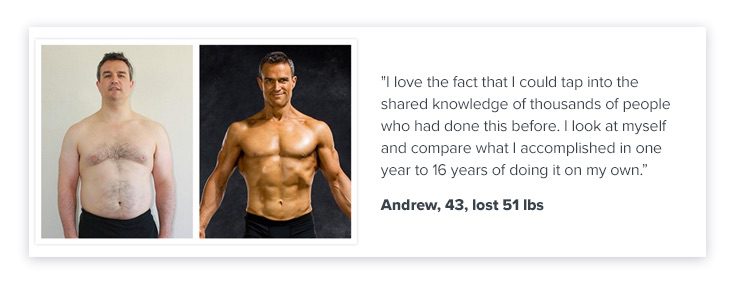
Or these:
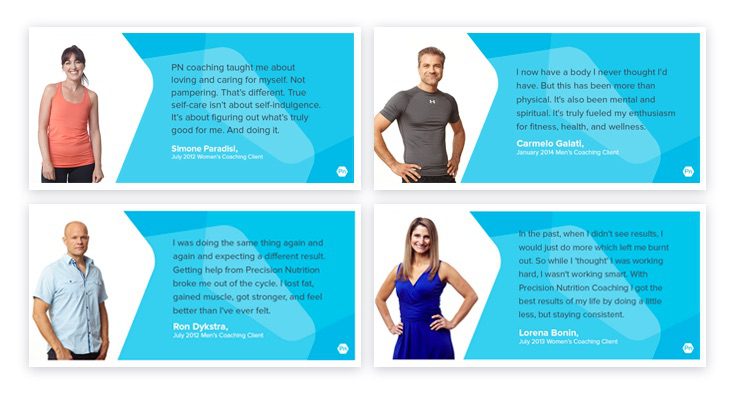
Or these:
- Precision Nutrition Coaching – Men’s Hall of Fame
(225+ men’s before and after photos. Ages 21-70)
- Precision Nutrition Coaching – Women’s Hall of Fame
(375+ women’s before and after photos. Ages 21-74)
Or these:
- Men’s profiles
(12 in-depth interviews with men’s coaching clients)
- Women’s profiles
(14 in-depth interviews with women’s coaching clients)
- Couple’s profiles
(7 in-depth interviews with couples who went through together)
6. Embrace the learning process.
At this point it should be no surprise that I think sustainable programs offer the most valuable and meaningful experience for coaches and clients.
You get to go deep into the heart of coaching and into the hearts of the people you coach. And that’s what real coaching is about!
Real coaching isn’t just quick, scrappy solutions and duct-taping things together until they fall apart again.
It’s building something strong and special from the ground up.
The longer you work with people, and the more you work with, the more you’ll understand what they want and need.
And you’ll learn how to help them get there.
This deep learning and understanding is a long-term process, but it’s worth it.
Use your understanding to benefit your clients and your business — to develop better marketing materials, to offer better programs, to deliver better results.
It’s a different way to coach, yes.
It’s not fast or flashy.
But it’s real. And it’s what many of the people coming to you really need.
Ready to build a thriving coaching practice?
Tested with over 100,000 clients now, Precision Nutrition’s ProCoach makes it easy to deliver the sustainable, research-proven nutrition and lifestyle coaching discussed in this article to anyone who needs it… from paying clients and patients, to family, to co-workers, to loved ones.
Want to coach in-person? Online? A combination of the two? Whatever fits your ideal lifestyle, it’s all possible with ProCoach.
With the ProCoach curriculum, coaching tools, and software, you’ll be able to turn what you learned in the Precision Nutrition Certification into a thriving practice, getting better results with dozens, even hundreds, of people while working less and living life on your own terms.
Interested? Add your name to the presale list. You’ll save 30% and secure your spot 24 hours before everyone else.
On Wednesday, November 28th, 2018, ProCoach becomes available to all Precision Nutrition Certification students and graduates.
If you’re interested and want to find out more, I’d encourage you to join our presale list. Being on the presale list gives you two special advantages.
- You’ll pay less than everyone else. At Precision Nutrition, we like to reward the most interested and motivated professionals, because they always make the best students and clients. Join the presale list and we’ll give you 30% off the monthly cost of Precision Nutrition’s ProCoach.
- You’re more likely to get a spot. Remember, last time we sold out within hours. But by joining the presale list you’ll get the opportunity to register 24 hours before everyone else, increasing your chances of getting in.
If you’re ready to help more people live their healthiest lives, grow your business, and worry less about time and money… ProCoach is your chance.
The post How to sell sustainable coaching in a world of ‘overnight abs’. 6 strategies for better client buy-in and a stronger coaching business. appeared first on Precision Nutrition.
Source: Health1
